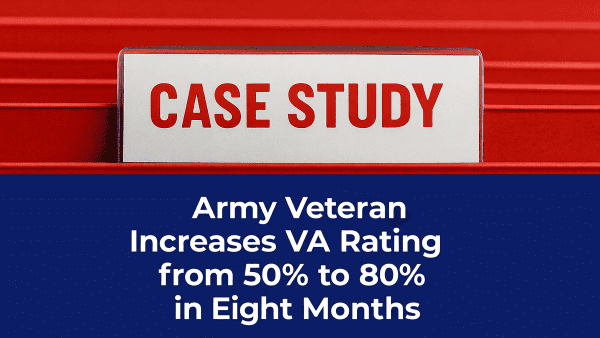Looking for Expert-Level VA Claim Answers?📱Call Us Now! 737-295-2226
In this blog, we’ll take a look at VA unwarranted reexaminations, exploring what they are, why they happen, and how they can impact your VA disability benefits.
Let’s begin.

Deserve a Higher VA Rating?
Book a no-obligation VA Claim Discovery Call with an experienced team member. We’ll review your situation, spot what the VA may have missed, and help you map out a strategy to unlock the VA disability rating and tax-free compensation you’ve earned for your service. Click the red button below to book your call.
What Are VA Unwarranted Reexaminations?
Unwarranted reexaminations refer to the VA’s practice of requiring veterans to undergo additional review examinations to assess the current status of their service-connected disabilities when in reality no exam should have been scheduled because it isn’t required.
These reevaluations occur after a veteran has already been granted VA disability benefits, often as a part of the VA’s routine review process.
When Should the VA NOT Schedule Review Examinations?
According to M21-1, the VA should not schedule a disability review examination if:
- The disability is static, without material improvement over five years
- The disability is permanent in character and of such nature that there is no likelihood of improvement
- The Veteran is over 55 years of age (except under unusual circumstances or where required by regulation)
- The evaluation is the prescribed schedular minimum within its DC
- The evaluation is 10 percent or less, or
- The combined evaluation would not change even if the reexamination resulted in a reduced evaluation for one or more disabilities.
Why Does the VA Conduct Unwarranted Reexaminations?
The VA conducts an unwarranted reexaminaton when it mistakenly orders a C&P exam that isn’t required.
Why does this happen?
It’s usually a mistake or a training gap that needs to be addressed within the VA.
Remember the primary reason behind a valid VA reexamination is to ensure veterans receive the appropriate disability compensation based on their current medical condition.
The VA seeks to verify whether a veteran’s service-connected disability has improved, worsened, or remained stable. If improvements are noted, it can reduce disability benefits, while worsening conditions may lead to increased compensation.

The Impact of Unwarranted Reexaminations on Veterans
While the VA’s intentions behind unwarranted reexaminations are well-intentioned, they can have significant consequences for veterans:
1. Added Stress and Uncertainty: Receiving notice of a reexamination can be stressful for veterans who are already dealing with the challenges of their disabilities. The uncertainty of the outcome can exacerbate anxiety and stress.
2. Financial Instability: Reducing disability benefits due to an unwarranted reexamination can lead to financial instability for veterans and their families. This abrupt change in income can be challenging to manage.
3. Time-Consuming Process: Undergoing reexaminations often require veterans to dedicate time and effort to attend medical appointments and provide updated medical records. This can be particularly burdensome for veterans with limited mobility or resources.

Challenges with VA-Mandated Reexaminations
The VA occasionally mandates reexaminations for veterans receiving disability benefits to reassess their medical conditions.
However, at times, these reexaminations may seem unwarranted to veterans, especially if their condition is static or unlikely to improve.
Veterans might perceive these as unnecessary hurdles in an already challenging journey.
While the VA aims to ensure accurate and updated assessments, these reexaminations can be burdensome for veterans, requiring them to prove the persistence or severity of their conditions repeatedly.

The Rationale Behind VA Unwarranted Reexaminations
VA Unwarranted Reexaminations are caused by a lack of pre-exam by RVSRs and routing these cases directly to a Veterans Service Representative (VSR) for scheduling the reexamination.
“Unwarranted reexaminations” are not part of their responsibility, “reexamination.” It just becomes unwarranted when they do it without reviewing veterans’ cases beforehand to see if the veteran really needs a reexamination.” –VA
Challenges and Concerns Surrounding Unwarranted Reexaminations
The practice of unwarranted reexaminations is not without its challenges and concerns:
- 1. Inefficiencies: Some argue that the VA’s resources could be better spent reviewing cases with a higher likelihood of change rather than conducting routine reevaluations for all veterans.
- 2. Emotional Toll: For veterans with service-connected disabilities, constant scrutiny and the fear of benefits reduction can harm their mental health.
- 3. Appeal Process: Veterans who believe they have been unfairly subjected to an unwarranted reexamination may need to navigate a complex appeals process to retain their disability benefits.
Additional Resources
What is the 55-Year Rule for VA Disability? (The Insider’s Guide)
5 10 20 Year Rule VA Disability: 3 Rules Every Veteran Should Know!

NEED MORE ASSISTANCE?
Most veterans are underrated for their disabilities and, therefore, not getting their due compensation. At VA Claims Insider, we help you understand and take control of the claims process, so you can get the back pain VA rating and compensation you’re owed by law.
Our process takes the guesswork out of filing a VA disability claim and supports you every step of the way in building a fully-developed claim (FDC).
If you’ve filed your VA disability claim and have been denied or have received a low rating—or you’re unsure how to get started—reach out to us! Take advantage of a VA Claim Discovery Call. Learn what you’ve been missing—so you can FINALLY get the disability rating and compensation YOU DESERVE!



